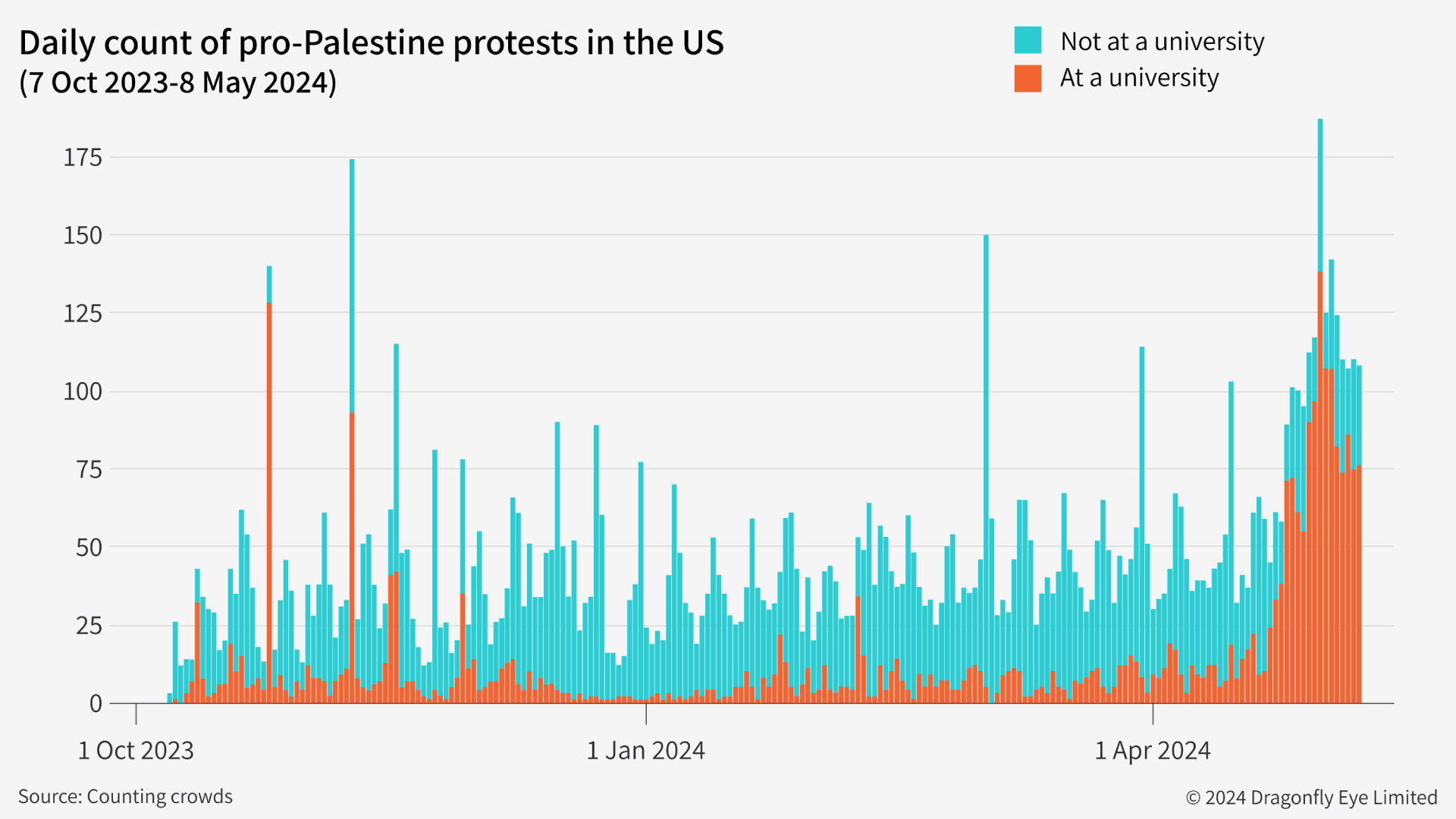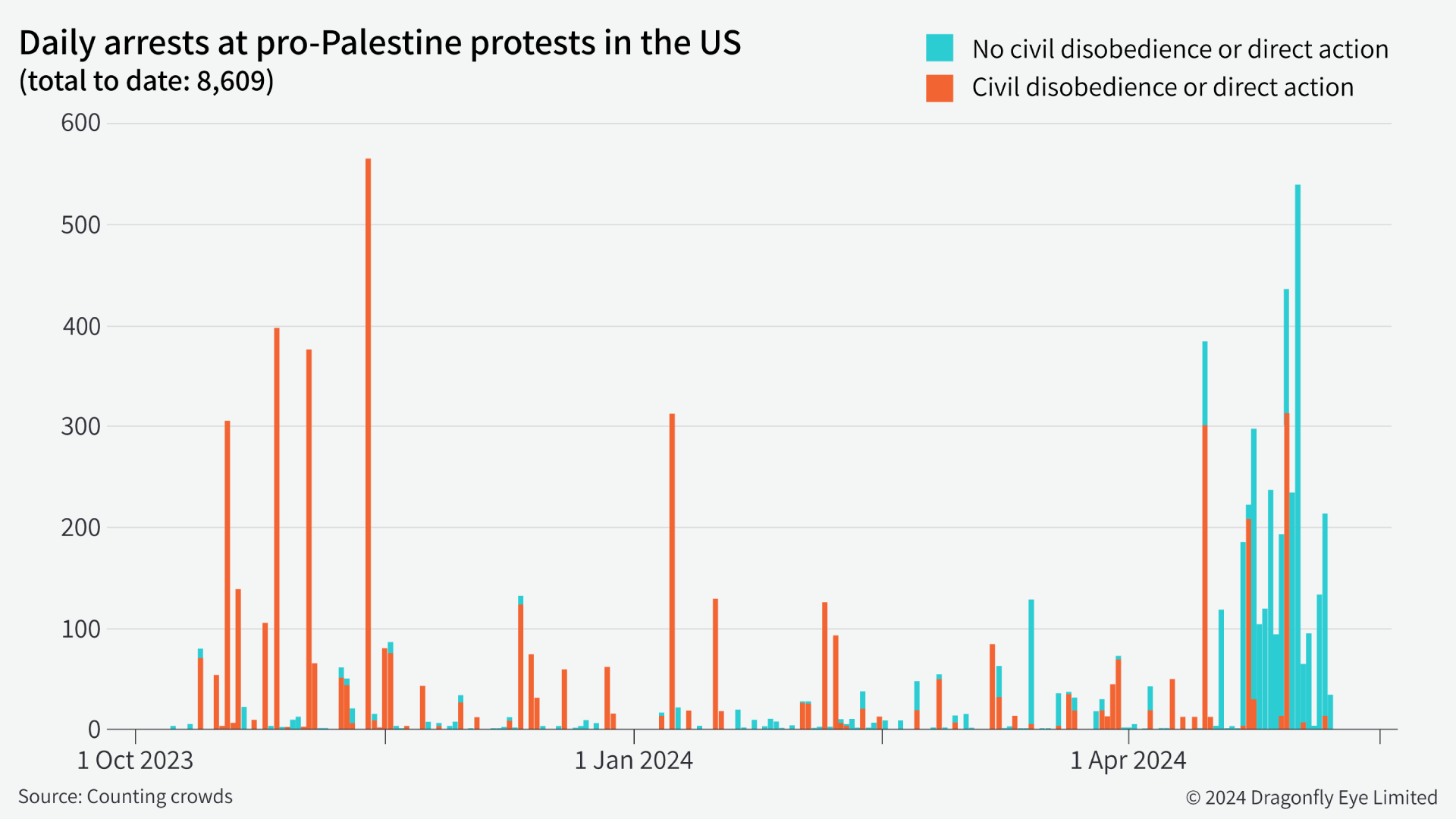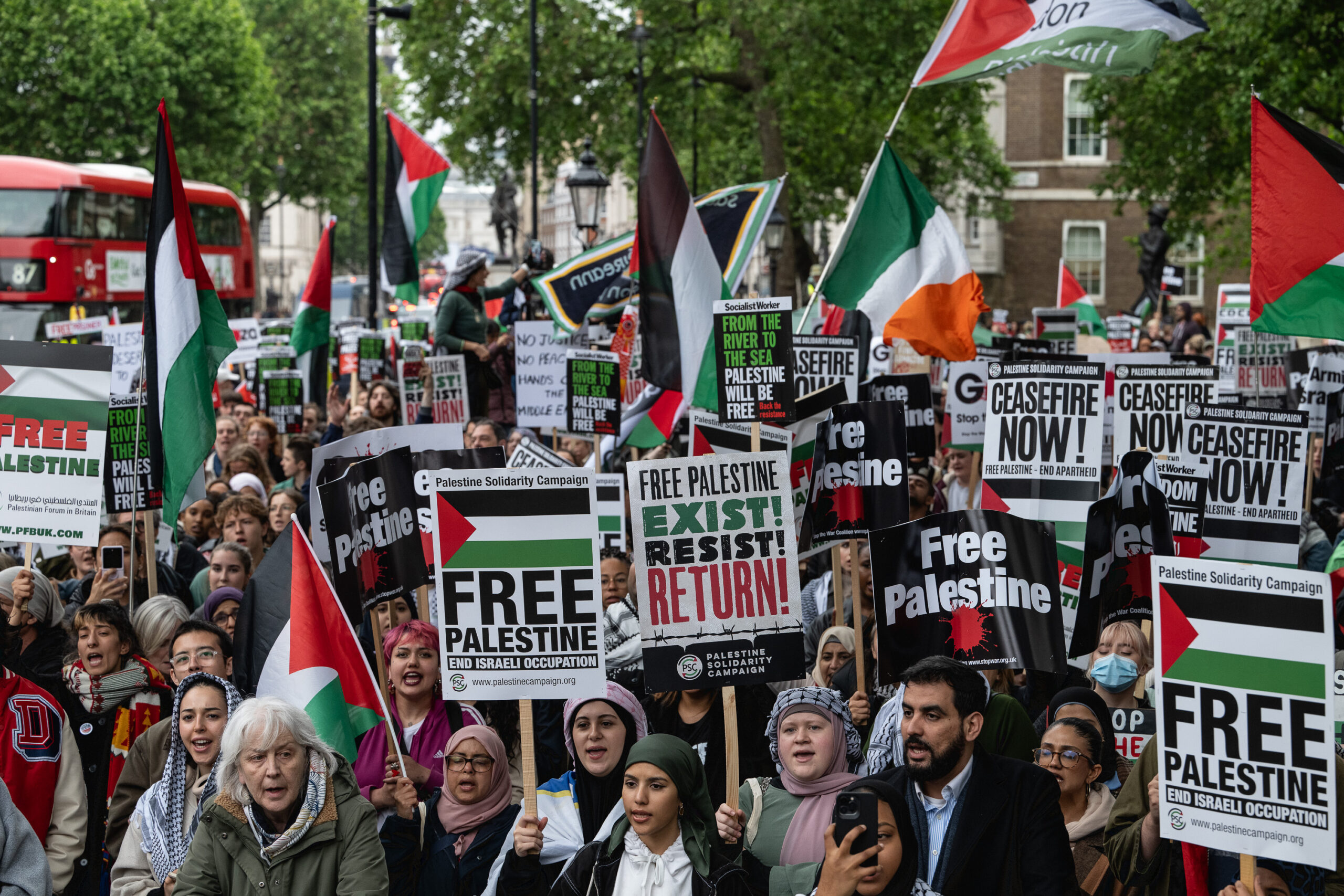Pro-Palestine activism is likely to be a recurring issue for organisations with ties to Israel for the coming years
This assessment was issued to clients of Dragonfly’s Security Intelligence & Analysis Service (SIAS) on 03 June 2024.
- Growing pro-Palestine sentiment globally is likely to result in weekly protest action and sustained boycott campaigns
- While the risk from direct action will probably remain limited over the coming years, reputational risks for firms with links to Israel will grow, in our assessment
The war in Gaza appears to have reinvigorated pro-Palestine activism globally. Rolling coverage of the war, including mass-casualty incidents over the past eight months, seems to be shifting global public opinion on the issue from very localised support in Muslim-majority countries to being more global. This is compounded by ongoing criminal cases by the International Court of Justice (ICJ) and the International Criminal Court (ICC) against Israeli officials.
Governments and organisations with ties to Israel are likely to be most exposed to pro-Palestine activism over the coming years. While this year, protests will continue to be tied to events in Gaza, beyond that it will likely expand as activists focus on Israel’s treatment of Palestinians more broadly. Direct and indirect pro-Palestine activism over the coming years will include:
- Negative online campaigns against firms with ties to Israel or perceived to be supporting it
- Calls for boycotts, divestment and sanctions against Israel and Israeli products as well as companies with significant ties to Israel, especially with its military and government
- Direct action such as sit-ins and vandalism at government buildings and at corporate offices of organisations perceived to be supporting the government and its military
- Negative publicity and opportunistic violent attacks during pro-Palestine protests against organisations with perceived links to Israel
Support for the Palestinian cause likely to become mainstream
Support for Palestinians is gaining global public support. This has been historically largely limited to Muslim and Arab communities, and left-leaning student groups, unions and political parties. But the latest conflict appears to have shifted public opinion in Europe and the US especially, based on recent opinion polls and our monitoring of traditional and social media. This is also reflected in the sustained weekly frequency of pro-Palestine protests in the US.

The US and UK are probably reliable indicators for this shift in public opinion, in our assessment. This is because historical polling data suggest pro-Israeli public stances are usually widespread there. This is compared with other European countries such as Spain, Italy and Ireland, where support for pro-Palestinian views is more widespread. A Gallup poll from March suggests that only 36% of Americans approve of Israeli military actions in Gaza, compared with 50% in November. A poll in March by the usually-reliable YouGov suggests a similar trend in the UK.
Shifts in governments’ policies towards the Palestinian issue are also likely to further embolden pro-Palestine groups and their ability to mobilise supporters. Spain, Ireland and Norway recognised Palestine as a state this month, and the latter’s sovereign wealth fund last week said it is monitoring firms selling arms to Israel. While we highly doubt US support for Israel would wane any time soon, Washington has threatened halting offensive weapons shipments to Israel and sanctioned Israeli extremists in the West Bank in recent months.
Pro-Palestine groups tactics against organisations to vary
Pro-Palestine activists appear highly intent on discrediting companies with links or are supportive of Israel. This includes direct action to disrupt or sabotage operations and being placed on boycott lists. In our analysis, how activists define ‘support’ for Israel continues to be largely inconsistent. Some groups only mention companies that have made very explicit and public statements in support of Israeli actions in Gaza. While some activists mention companies for boycotts because of statements made by executives, sponsors and overseas franchises, especially those located in Israel.
Companies with extensive investments in Israel, especially with the Israeli government or military face a very high risk of such direct actions. Defence, technology and construction companies in particular have been frequently targeted with vandalism and sabotage operations at their offices and warehouses since October. Groups such as Palestine Action appear to be working with left-wing anarchists and environmental groups. Direct action has been most prevalent in the UK, Ireland and the US and usually involve sit-ins and sabotage of site infrastructure.

Still, direct action such as sabotage and vandalism is likely to remain isolated and highly targeted this year. As the graph above shows, in the past couple of months most arrests at US protests are not for direct action. The main threat of violent direct action against businesses seems to stem from far-left extremists rather than mainstream pro-Palestine groups. We have not seen signs that a coordinated campaign of violent attacks against companies is likely. As is the case with environmental activists, it tends to be harder to recruit people for such actions.
Growing boycott campaigns likely to have a limited impact
Boycott campaigns are likely to remain more wide ranging in terms of targets compared with direct action. This means companies with perceived ties or support for Israel are at risk of being placed on such lists, irrespective the accuracy. McDonalds and Starbucks for example feature prominently on pro-Palestine boycott lists, despite little evidence to support activists’ claims of their support for Israel. Other companies also feature on boycott lists due to prominent Jewish and Israeli executives (past and present) even if they have not made public statements on the conflict.
Still, boycott campaigns are unlikely to grow enough to significantly affect revenues for businesses in most countries in the coming years. Several Western government bodies outlaw boycotts against Israel. However, these campaigns seem to be gaining momentum in MENA and Asia. Several prominent Western consumer brands recently said revenues had declined due to ‘the conflict’, citing places like Egypt, Indonesia, Malaysia, Morocco and Turkiye. No international firm provided details on how much the conflict has affected their bottom line. But a Pakistani can-maker for Pepsi and Coca Cola said sales dropped by 11% in the first quarter of this year.
Frequent protests likely until the end of the year
Pro-Palestine protests globally are likely to continue on a weekly basis for the duration of the war in Gaza. Weekly protests have occurred in major cities across Europe and the US and MENA since October. The size and intensity of these demonstrations seems to be driven by developments in the war. This mostly includes online footage of Israeli rights abuses in Gaza or mass casualty attacks. This week for example protests took place globally in response to an Israeli strike in Rafah on a displacement camp, killing at least 45 people, according to international aid groups.
Violence against commercial sites seems to mostly be occurring during protests and largely on an opportunistic basis. This includes rock throwing and looting of shop fronts and offices during pro-Palestine marches. These incidents appear more likely in the Middle East (Turkiye, Jordan, Lebanon) and Asia (Pakistan, Indonesia, Malaysia), based on precedent so far this year. Isolated attacks of a similar nature are usually rare in Europe – particularly in France and the UK – and the US. The UK and French police statements on such incidents in the past suggest extremist religious groups and anarchists are usually behind these attacks.
Long term reputational risks to rise
Reputational risks for organisations with ties to Israel are likely to grow beyond the current war in Gaza, which we forecast will last several more months. This is not least because recurring conflicts between Israel and Palestinian groups over the long term (five years) are very likely. But also due to ongoing international legal proceedings against Israel, which will both bring media attention to Israel’s occupation of Palestinian territories, but also its prosecution of the current war. These legal proceedings, and any subsequent punitive actions by countries and international bodies against Israel will serve as a flashpoint for such sentiment and actions to rise again.
Image: Pro-Palestine demonstrators listen to speeches at a protest organised by the Palestinian Solidarity Campaign in response to Sunday’s air strike on a tent encampment in Rafah, on 28 May 2024, in London, England. Photo by Guy Smallman/Getty Images.




